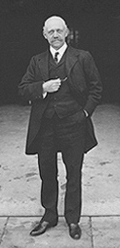- William Willett
Infobox Person
name = PAGENAME
image_size = 150px
caption =William Willett in 1909
birth_name =
birth_date =10 August 1856
birth_place =Farnham, Surrey
death_date =4 March 1915
death_place =
death_cause =
resting_place =
resting_place_coordinates =
residence =
nationality =United Kingdom
other_names =
known_for =daylight saving time
education =
employer =
occupation =inventor
home_town =
title =
salary =
networth =
height =
weight =
term =
predecessor =
successor =
party =
boards =
religion =
spouse =
partner =
children =
parents =
relatives =
website =
footnotes =William Willett (
10 August 1856 –4 March 1915 ), is the inventor ofdaylight saving time .Biography
Willett was born in
Farnham, Surrey , in theUnited Kingdom , and educated at the Philological School. After some commercial experience, he entered his father's building business, Willett Building Services. Between them they created a reputation for "Willett built" quality houses in choice parts ofLondon and the south, including Chelsea [cite journal|author=David Prout|title=Willett built|journal=Victorian Society Annual|date=1989|pages=21–46] andHove . He lived most of his life inChislehurst ,Kent , where, it is said, after riding his horse inPetts Wood near his home early one summer morning and noticing how many blinds were still down, the idea for daylight saving time first occurred to him.This was not the first time that the idea of adapting to daylight hours had been mooted, however. It was common practice in the ancient world, [cite journal|title=Daylight saving in ancient Rome|author=B.L. Ullman|journal=The Classical Journal|volume=13|issue=6|pages=450–451|url=http://links.jstor.org/sici?sici=0009-8353%28191803%2913%3A6%3C450%3ADSIAR%3E2.0.CO%3B2-Z|date=1918-03] and
Benjamin Franklin resurrected the idea in a light-hearted 1784 satire. [cite journal|author=Benjamin Franklin , writinganonymously |title=Aux auteurs du Journal|journal=Journal de Paris|date=1784-04-26|issue=117|language=French The [http://webexhibits.org/daylightsaving/franklin3.html revised English version] is commonly called "An Economical Project".] Although Franklin's facetious suggestion was simply that people should get up earlier in summer, he is often erroneously attributed as the inventor of DST while Willett is often ignored.Using his own financial resources, in 1907 William published a pamphlet "The Waste of Daylight" [cite paper|author=William Willett|title=The waste of daylight|date=1907-07|version=1st edition|url=http://webexhibits.org/daylightsaving/willett.html | cite paper|author=William Willett|title=The waste of daylight|date=1914-03|version=19th edition|url=http://www.pettswoodvillage.co.uk/Daylight_Savings_William_Willett.pdf] In it he proposed that the clocks should be advanced by 80 minutes in the summer. The evenings would then remain light for longer, increasing daylight recreation time and also saving ₤2.5 million in lighting costs. He suggested that the clocks should be advanced by 20 minutes at a time at 2 am on successive Sundays in April and be retarded by the same amount on Sundays in September.
Through vigorous campaigning, by 1908 Willett had managed to gain the support of an MP,
Robert Pearce , who made several unsuccessful attempts to get it passed into law. A youngWinston Churchill promoted it for a time, [cite journal|author=Winston S. Churchill |title=A silent toast to William Willett|url=http://www.winstonchurchill.org/i4a/pages/index.cfm?pageid=266|journal=Pictorial Weekly|date=1934-04-28] and the idea was examined again by a parliamentary select committee in 1909 but again nothing was done. The outbreak of the First World War made the issue more important primarily because of the need to savecoal .Germany had already introduced the scheme when the bill was finally passed in Britain on17 May 1916 and the clocks were advanced by an hour on the following Sunday,21 May , enacted as a wartime production-boosting device under theDefense of the Realm Act . It was subsequently adopted in many other countries.William Willett did not live to see daylight saving become law, as he died of
influenza in 1915 at the age of 58. He is commemorated inPetts Wood by a memorialsundial , set permanently to daylight saving time. The "Daylight Inn" in Petts Wood is also named in his honor and the road Willet Way. His house in theLondon Borough of Bromley is marked with ablue plaque . He is buried in the churchyard atSt Wulfran's Church, Ovingdean , in the city ofBrighton and Hove .cite book |last=Dale |first=Antony |title=Brighton Churches |origyear=1989 |publisher=Routledge |location=London EC4 |isbn=0-415-00863-8 |pages=p207 ]Willett is the great-great-grandfather of Coldplay frontman
Chris Martin and the great-great-uncle of British television and radio presenter and voiceover artistMyma Seldon .References
Further reading
*
*
* The British version, focusing on the UK, is cite book|url=http://savingthedaylight.com/|title=Saving the Daylight: Why We Put the Clocks Forward|publisher=Granta Books|isbn=1-86207-796-7
*
Wikimedia Foundation. 2010.
